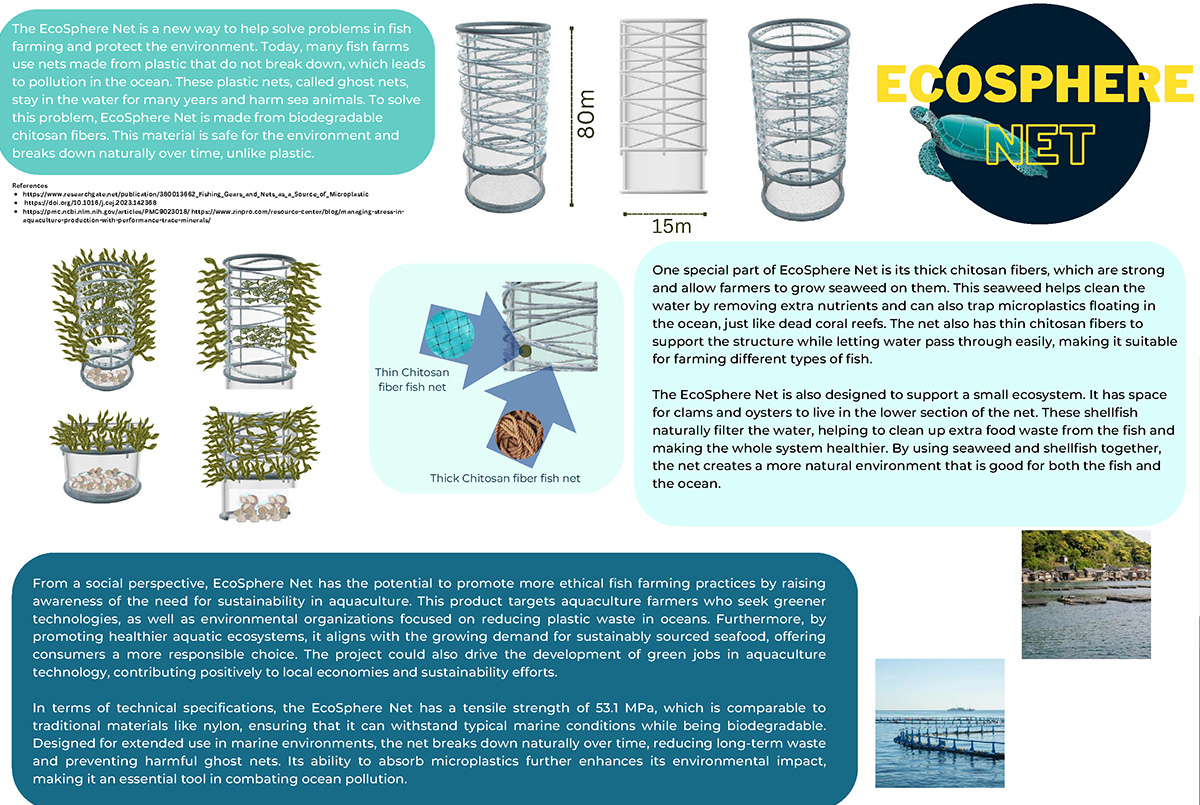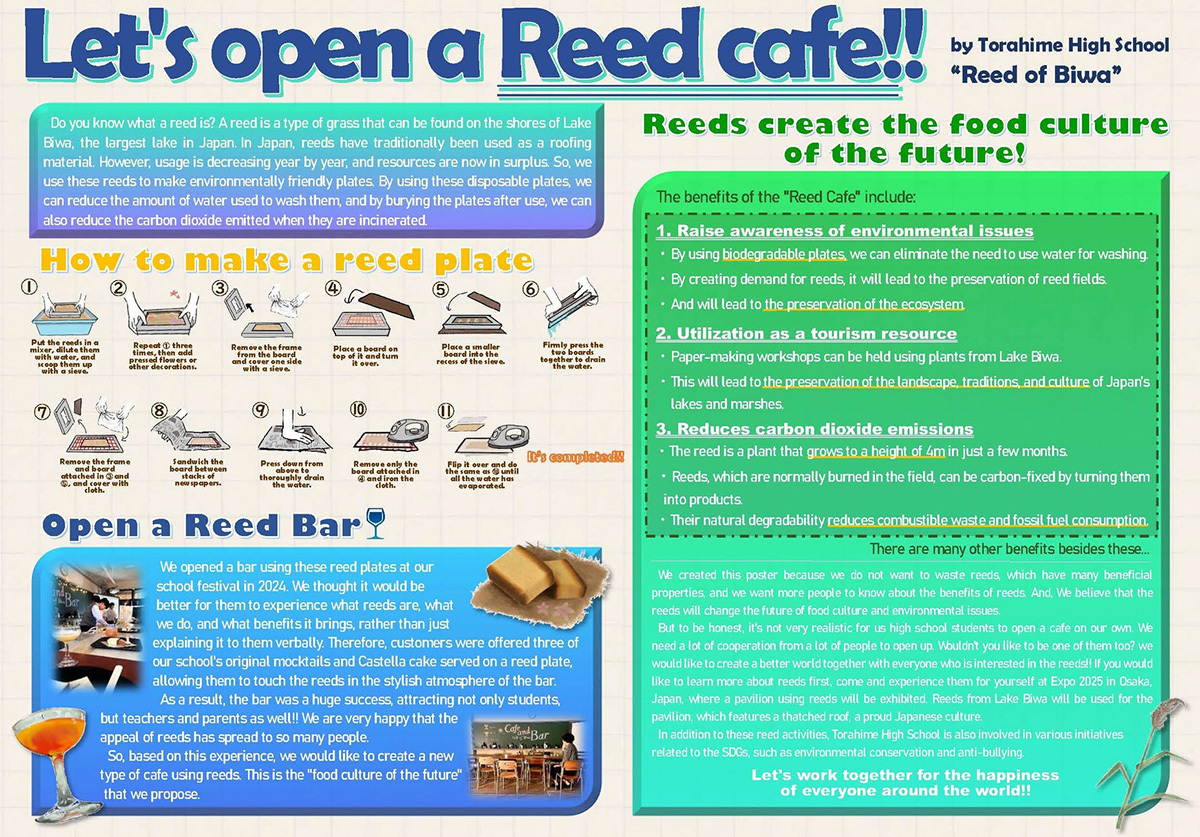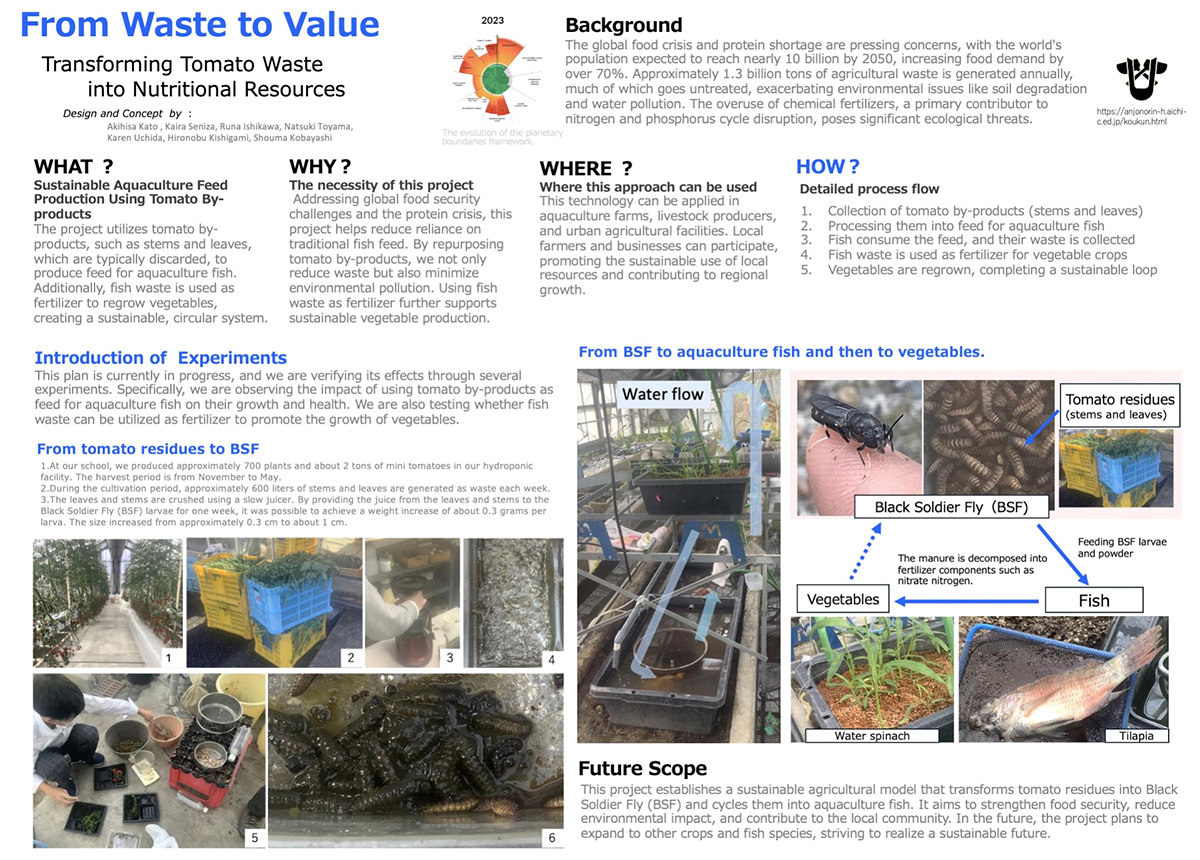SDGs Design International Awards 2024
Results Announcement
 Gold Award
Gold Award
The Urban Farm Plug-In
Chen Jia Yue
University of Malaya, Malaysia

The Modular Urban Farm System aims to address food security challenges in urban centers by transforming underutilized vertical spaces within high-rise buildings, such as hotels, office towers, and serviced apartments, into sustainable food production zones. This system offers an alternative to traditional farming, which is typically located in outskirt areas, by integrating efficient farming solutions into urban environments. By doing so, the design ensures a continuous supply of fresh produce during crises and reduces reliance on external food supply chains.
This solution is designed for developers and operators of high-end high-rise buildings, including hotels, office towers, and serviced apartments, that typically have expansive reception lobbies or common areas. The modular nature also makes it suitable for cities with high population density and limited land for traditional agriculture. The system’s modularity allows for easy installation and scalability, adapting to various building layouts and sizes. It promotes urban self-sufficiency, reducing food transportation costs and carbon emissions while offering fresh, local produce.
The use of advanced farming techniques, such as hydroponics or vertical farming, ensures resource efficiency with minimal water and energy consumption. Furthermore, the design turns unused vertical space into an aesthetic and functional green feature, enhancing the environmental and social value of the buildings. This approach not only contributes to food security during crises but also integrates sustainable farming into the fabric of urban life.



 Silver Award
Silver Award
Like Water is Born in Water - Organic potato-growing program for rural women to address saline and shoreline erosion issues
Yuze Zhang
Southwest Jiaotong University, China

Environmental disasters in the Hue Lagoon area of Vietnam, where shoreline erosion is increasing year by year and the area of saline and alkaline land is expanding, have had a severe impact on local food production, economic development, and ecological environment, while at the same time, the cultural decline of the local matrilineal clans, the plight of rural women's unemployment, the lack of a stable source of income, and the low social status of the family in the area of production have become progressively more serious.
In response to these problems, a new path for the organic potato cultivation industry to support indigenous people has been mapped out for rural women through the help of the government and scientific research enterprises. Continuing the quality of traditional production and maintaining ecological sustainability are important considerations for the introduction of new technologies, and modern production methods are integrated into the traditional agricultural landscape, utilizing the many declining traditional temples on both sides of the lagoon for scientific research and teaching purposes. The project plans a tourist route to visit the agricultural waterfront, balancing the industrial conflicts between mangrove conservation and shrimp and crab farming and improving the coastal ecosystem.



 Bronze Award
Bronze Award
EcoSphere Net
Hiew Wing Yian, Lai Jun Tung
National University of Singapore, Singapore / University of Science and Technology of China, China

Our design is a fish farming net made from chitosan fibers to create an eco-friendly and multifunctional fish farming environment. It consists of two main components: thick chitosan fibers (forming the plastic tube-like structure) and thin chitosan fiber nets that provide structural support while allowing efficient water flow.
The thick chitosan fibers serve as a base for seaweed cultivation, which enhances water quality by absorbing excess nutrients and capturing microplastics, similar to how dead coral reef skeletons attract and hold such particles. This characteristic addresses the growing issue of microplastic pollution in the ocean.
The lower section of the structure has a designated space for rearing clams and oysters. These shellfish are natural biofilters, capable of treating excess food waste from fish and improving the overall health of the aquatic system. Integrating shellfish into the design creates a more self-sustaining ecosystem that minimizes waste and promotes cleaner water.
The target users are environmentally conscious aquaculture operators and sustainable fish farmers who seek an eco-friendly alternative to traditional plastic-based fish nets. This chitosan-based net offers a biodegradable solution, reducing long-term waste and environmental damage caused by ghost nets and plastic debris.
Key appealing points include its biodegradability, ability to capture microplastics, and integrated ecosystem approach that combines fish farming with seaweed cultivation and shellfish rearing to promote a sustainable aquaculture model. This structure aligns with the growing demand for green technologies in the aquaculture industry and offers an innovative solution for improving environmental impact while supporting efficient fish farming.



 Helix Experience Award
Helix Experience Award

PizzUs! - International & multicultural restaurant design
Wang Pingcheng, Chen Feixue
Kyushu University, Japan

The "PizzUs!" project aims to create an inclusive and multicultural dining experience that connects people from diverse backgrounds. It focuses on providing thoughtful and engaging design, from in-store signage to modular seating, fostering a friendly atmosphere for tourists and locals.
The design primarily targets international tourists visiting Fukuoka and residents interested in social dining. It emphasizes inclusivity, welcoming people from different countries, cultures, and language backgrounds.
Key innovations include:
- Pizza slice-shaped modular tables that encourage solo or group dining.
- Adaptable "Yatai" style setups.
- Interactive signage inspired by pizza slices to aid wayfinding.
The design also integrates social elements, such as sharing food and ideas, building friendships, engaging in cross-cultural dialogues, and fostering mutual understanding and friendship. Additionally, the ordering interface, named "Cornicione," is designed to be user-friendly, offering language translation, currency conversion, and personalized dish recommendations.
Additionally, the initiative supports social welfare by organizing food donation events, allowing patrons to contribute to local needs. Overall, "PizzUs!" is expected to create a welcoming, socially responsible environment that enhances Fukuoka’s reputation as a vibrant and inclusive city.



 Special Awards for High School Students
Special Awards for High School Students
Let's open a Reed cafe!!
Haruna Uno, Rimina Nishimura
Torahime High School, Japan

Reeds, a water-extracting plant that grows at Lake Biwa in Shiga Prefecture, have greatly influenced the preservation of the ecosystem, the purification of water quality, and the formation of the culture of Omi. It is harvested once a year and used for thatching and reed screens, but in recent years they have been abandoned in favour of petroleum-based plastics. We attempted to develop biodegradable paper plates by utilizing these abandoned reeds.
The project has two main objectives. The first is to protect Lake Biwa, a major water source in Japan. In recent years, Lake Biwa has faced many problems other than a decline in water level. Abandonment of water-drawing plants such as reeds, ecosystem disruption, and changes in the water level due to abnormal weather conditions are just a few examples. What we can do as individuals is to conserve water. The ultimate goal of using disposable paper plates made from reeds is to re-examine the assumption of the need to wash dishes.
The second is creating opportunities for many people to think about Lake Biwa by developing educational programs on producing products using reeds and creating workshops as a tourist resource. Reeds, which have been inconspicuous due to the spread of petroleum-based materials, have very little publicity, even among those living in Shiga Prefecture. By seeing, touching, and becoming more familiar with reeds, we hope to make people think about Lake Biwa once again.



From Waste to Value: Transforming Tomato Waste into Nutritional Resources
Akihisa Kato, Kaira Seniza, Runa Ishikawa, Natsuki Toyama, Karen Uchida,Hironobu Kishigami, Shouma Kobayashi
Anjo Agricultural High School, Japan

The global food crisis and protein shortage are pressing concerns, with the world's population expected to reach nearly 10 billion by 2050, increasing food demand by over 70%. Approximately 1.3 billion tons of agricultural waste is generated annually, much of which goes untreated, exacerbating environmental issues like soil degradation and water pollution. The overuse of chemical fertilizers, a primary contributor to nitrogen and phosphorus cycle disruption, poses significant ecological threats.
This project aims to utilize agricultural waste from tomatoes to promote sustainable feed production. In response to global food issues and protein crises, we transform tomato stems and leaves into feed for Black Soldier Fly (BSF) larvae, which are then used as feed for fish such as tilapia. This process converts waste into a valuable resource and reduces environmental impact.
The target users include aquaculture producers, livestock farmers, and urban agriculture facilities. This innovative approach enhances the sustainability and resource efficiency of their operations. By minimizing the use of chemical fertilizers, which impose a high environmental burden during production and waste valuable resources, our system emphasizes recycling local resources.
This initiative promotes the local processing and consumption of both edible portions and by-products, supporting local economies while reducing carbon emissions associated with transportation. Through this project, we aim to contribute to waste reduction, support regional economies, and address urgent food security challenges.





